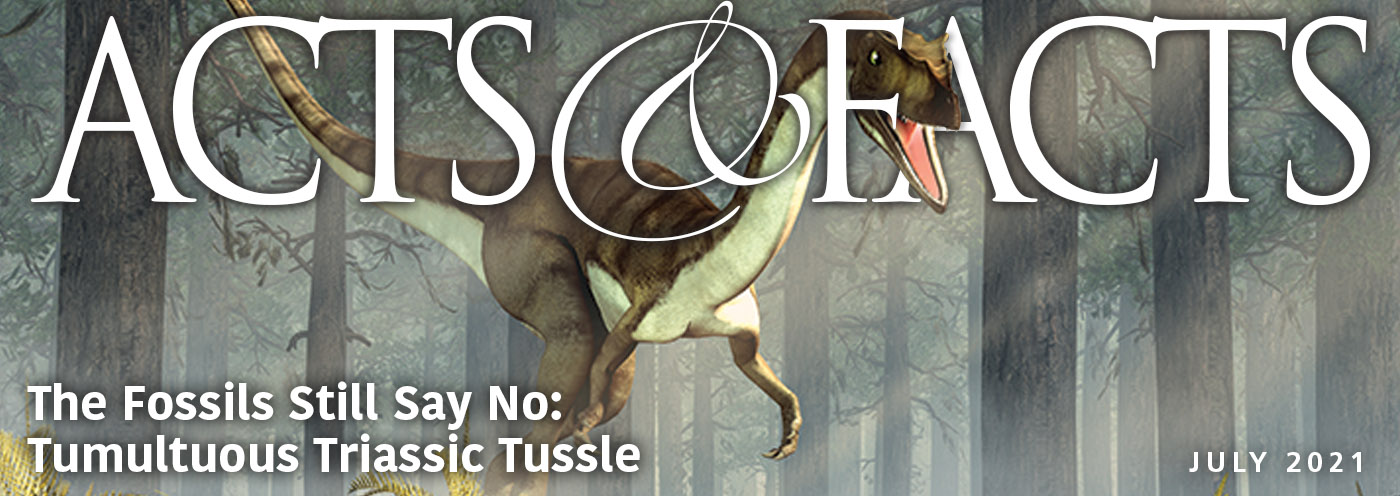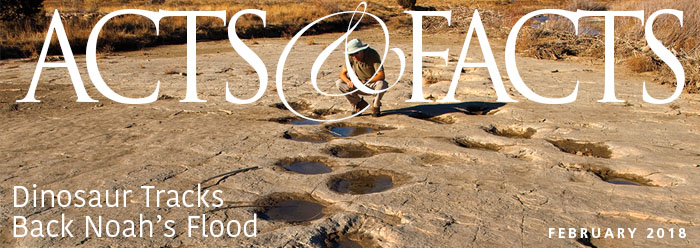by Brian Thomas, M. S. and Frank Sherwin, M.A.*
Optimism in evolution…the words form a contradiction, considering that according to macroevolutionary theory, “progress” can only take place through eons of death and destruction. Yet that was the title of a column that recently appeared in The New York Times in which evolutionary biologist and guest commentator Olivia Judson said that attempts to remove evolution from America’s classrooms are “a travesty” and “dangerous.”1
In her article, Judson cited what she believes to be evidence supporting evolution: insect resistance to pesticides, antibiotic resistance in microbes, new varieties of flu virus, earlier aging of cod fish, shrinkage in ram horn size, and shifting behaviors in guppies. However, each of these changes demonstrates a variation within kind, not the vertical changes that are needed for “microbe to man” evolution. Rather than a gain in genetic complexity, each of these examples represents a reshuffling or degradation of old information.
If, as Judson insists, only evolutionary theory is allowed in our taxpayer-paid schools, the freedom to analyze these types of questionable examples will be curtailed. Instead of being trained to critically think, students will learn to categorically ignore.
Judson suggests that barring evolution-only science curricula will lead students to have “a contempt for evidence.” She does not explain how expanding scientific inquiry beyond the limits of a single, flawed paradigm would have this effect. Consider that Sir Isaac Newton, Carolus Linnaeus, Michael Faraday, George W. Carver, and Luis Pasteur pioneered the foundational laws of motion and calculus, the sciences of botany and classification, the laws of electromagnetism, agriculture, and the science of microbiology, respectively—and they did it entirely without the paradigm of evolution.
In addition, a large host of practicing research scientists today recognizes the inadequacy of evolution.2 How do these men, noted for their accomplishments to science, demonstrate a contempt for evidence?
Judson ends her article in round-eyed awe at the revelations and opportunities that evolution can provide.
[F]or me, the most important thing about studying evolution is…that the endeavor contains a profound optimism. It means that when we encounter something in nature that is complicated or mysterious, such as the flagellum of a bacteria or the light made by a firefly, we don’t have to shrug our shoulders in bewilderment….And if at first it seems so complicated that the evolutionary steps are hard to work out, we have an invitation to imagine, to play, to experiment and explore. To my mind, this only enhances the wonder.1
Biologist Dr. William Provine of Cornell University has a clearer understanding of the impact of evolutionary theory:
Let me summarize my views on what modern evolutionary biology tells us loud and clear—and these are basically Darwin’s views. There are no gods, no purposes, and no goal-directed forces of any kind. There is no life after death. There is no ultimate foundation for ethics, no ultimate meaning in life, and no free will for humans, either.3
Evolution does not offer any reason to feel hope or wonder. The conditions Provine noted—no free will, no foundation for ethics, no meaning in life—are hardly sources for optimism, even for one studying “complicated and mysterious” phenomena.
References
- Judson, O. Optimism in Evolution. The New York Times. Posted on nytimes.com August 12, 2008, accessed August 15, 2008.
- A Scientific Dissent from Darwinism. Fact sheet from the Discovery Institute. Posted on www.discovery.org, accessed August 15, 2008.
- Provine, W.B. 1994. Darwinism: Science or Naturalistic Philosophy? A debate between William B. Provine and Phillip E. Johnson at Stanford University. Origins Research. 16 (1): 9.
* Mr. Thomas is Science Writer; Mr. Sherwin is Senior Science Lecturer.
Article posted on August 18, 2008.







